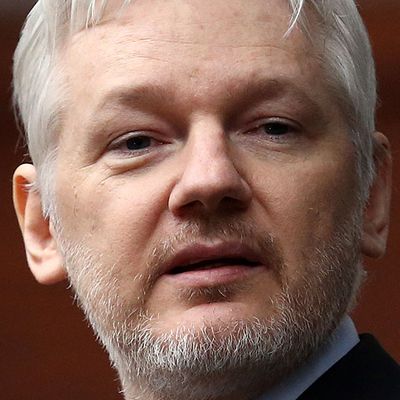
Julian Assange, the founder and head of WikiLeaks, has laid his cards on the table: He views it as his mission to do what he can to prevent Hillary Clinton from becoming president of the United States of America. And his reasons aren’t just political, as Charlie Savage wrote earlier this week in the New York Times: In an interview with Robert Peston of ITV on June 12, Savage wrote, Assange “suggested that he not only opposed her candidacy on policy grounds, but also saw her as a personal foe.”
Recently, the internet rumor mill has been circulating an enticing possibility for those rooting for an Assange takedown of Clinton: Assange says that he has, in his possession, an email or emails that will offer “enough evidence” — that’s the simple, two-word quote that is repeated over and over and over, everywhere — for authorities to indict Clinton. If you Google “Clinton Assange indictment,” the headlines scream off the screen, each more excitable than the last: “Democrat Scandal: Julian Assange Claims New Leaks Will Send Hillary Clinton to Prison Over Campaign to Destroy Bernie Sanders,” “BREAKING: WikiLeaks founder Julian Assange says his next leak will virtually guarantee an indictment of Hillary Clinton,” “Julian Assange: My Next Leak Will Ensure Hillary’s Arrest,” and so on. (Disclosure: My brother does data analysis for the Clinton campaign.)
Suffice it to say, this would be a big deal. If Hillary Clinton got indicted, it would virtually hand the election to Donald Trump. But after the millions of dollars Republican members of Congress spent investigating the Benghazi attacks, the yearlong FBI inquiry into Clinton’s use of a private, non-secure server for emails that led to that agency’s director, James Comey, publicly reprimanding Clinton as “extremely careless” but declining to press charges, and the endless scrutiny of the Clinton Foundation’s finances, what could such an email possibly contain?
Or maybe that’s the wrong question to be asking. Based on my attempt to verify the quote in question, Assange may have never actually claimed to have such materials. Rather, this may have all been an out-of-control game of internet telephone, of rumormongering at its worst and least responsible, propagated by outlets hostile to Clinton and eventually reaching the pages of the top newspaper in the United States, the Times, and one of the top papers in Canada, the National Post. At the very least it appears that the most popular version of the blockbuster-emails story — that Assange told ITV a future release will contain “enough evidence” to indict Clinton — is false, despite having been endlessly echoed online. Assange did not make that claim in that interview, and while it’s hard to prove the total nonexistence of a two-word quote, there’s no clear evidence he uttered that phrase in an interview at all.
Before explaining what’s going on here, it’s important to make clear that Assange has said that WikiLeaks will be dumping juicy Clinton-related documents in the future. But this is different, and less surprising, from the idea of Assange’s explicitly mentioning a specific email or emails that could lead to a Clinton indictment. It’s one thing to say We’re going to release emails that will make Hillary Clinton look bad, which WikiLeaks has done and will undoubtedly continue to do whenever it can, and it’s quite another to say We’re going to release emails that will land Hillary Clinton in prison.
The confusion that gave rise to the “enough evidence” rumor might stem from the fact that the ITV spot was a bit of a train wreck. Mostly, the interview has been spread around online via this link to a shortened version, but what appears to be the full, start-to-finish interview is here, with the Clinton portion coming in the last 3:30 or so:
As Savage notes in his Times writeup, part of the reason this interview slipped under the radar when it first aired was because “Mr. Peston appeared to mistakenly assume that WikiLeaks had obtained still-undisclosed emails from the private server Mrs. Clinton had used while secretary of state and kept cutting Mr. Assange off to ask about it.” But those emails had actually already been published by the State Department as a result of the FBI’s investigation into Clinton’s cybersecurity (or lack thereof) practices — WikiLeaks just compiled them into an easy-to-search database. That’s why the interview is a bit hard to fully follow: As Savage writes, “it now seems clearer that Mr. Assange was trying to talk about the Democratic National Committee emails,” even as Peston was pressing him about server emails. He was giving a hint about the big reveals to come — the emails that led to a fair amount of Democratic embarrassment, and to the ouster of Debbie Wasserman Schultz as chair of the DNC.
But on the question of whether Assange mentioned the possibility of a Clinton indictment in that interview, the answer is clear: Yes, he did, but in a very specific and not particularly explosive way. It comes at around the five-minute mark of the full video:
We have accumulated a lot of material about Hillary Clinton — we could proceed to an indictment. But because Loretta Lynch is the DoJ, head of the DoJ in the United States, appointed by Obama, Loretta Lynch is the person in charge of our case [meaning the government’s investigation of WikiLeaks’ dissemination of classified government documents]. She’s not going to indict Hillary Clinton, that’s not possible that could happen, but the FBI can push for concessions from the new Clinton government in exchange for its lack of indictment. But there’s very strong material, both in the emails and in relation to the Clinton Foundation. For example, we published an email where Hillary Clinton is instructing her staff to remove the ‘Classified’ header of a classified document and send it by a non-classified fax. So that just requires one more thing, which is to show that the document was actually sent. But she instructed her staff to violate those classification procedures in the United States.
Assange is claiming that one of the emails WikiLeaks had already published at that time (via the State Department releases) could potentially be indictment-worthy — in the context of future evidence that hasn’t yet emerged — but that he finds that extremely unlikely. He’s making the common-sense observation that the Democrat-appointed attorney general is probably not looking to go out of her way to indict a Democratic former secretary of State who is running for President during the peak of a presidential campaign.
(Update: On Twitter, Savage points out that when you include Assange’s words from immediately prior to what I excerpted, it sounds like he’s saying something a bit different, though some interpretation is required with regard to the placement of the quotation marks:
The FBI is going to go, “We have accumulated a lot of material about Hillary Clinton — we could proceed to an indictment. But because Loretta Lynch is the DoJ” — head of the DoJ in the United States, appointed by Obama — “Loretta Lynch is the person in charge of our case. She’s not going to indict Hillary Clinton, that’s not possible that could happen.” But the FBI can push for concessions from the new Clinton government in exchange for its lack of indictment. But there’s very strong material, both in the emails and in relation to the Clinton Foundation …
In this reading, “our case” — again, per Savage on Twitter — refers to the government’s hypothetical case against Clinton, not against WikiLeaks. In listening to the interview, I had processed a pause in Assange’s speech as him trailing off and switching his train of thought: “The FBI is going to go … We have accumulated … ” I actually think Savage’s interpretation is more likely. If he’s right, then it gets even harder to interpret this segment as Assange claiming there is still-unreleased material that will lead to Clinton’s indictment — rather, he’s imagining that the FBI believes it already has enough evidence to indict, but that investigators there realize that Lynch’s allegiances make that a political impossibility.)
Now, the full story of Clinton’s asking for the header to be removed is a bit murky, and there are potentially nonincriminating explanations. But setting aside the merits of Assange’s legal analysis, there is no point in this clip, or the ITV segment on the whole, when he claims specifically that he is sitting on unreleased material that will likely lead to Clinton’s indictment, or when he uses the phrase “enough evidence” to describe the contents of a leak-to-come. Plus, that claim makes no sense in the full context of the clip: If he was anticipating an indictment, why would he be talking about his hopes for the FBI to extract concessions from a “new Clinton government”? Yet the interview has been presented, thousands of times now if you factor in the internet’s bottom-feeders, as proof that Assange is going to be releasing some bombshell materials that pose a serious legal threat to Clinton. (An email to WikiLeaks seeking comment bounced back.)
The “enough evidence” quote turns out to be rather ghostly — almost every time it is mentioned online, it’s either attributed to the ITV interview or disconnected from any sourcing whatsoever. Trying to track it down leads deep down a dark internet rabbit hole. In a Russia Today segment posted to YouTube Wednesday, for example, the host leads off by saying that “Julian Assange is now preparing to release more leaked emails, and this time he says they will, quote, provide enough evidence to indict Hillary Clinton.” The host doesn’t provide the source of the quote (or make it clear where it leaves off). If you then Google “Assange” and the exact phrase “enough evidence,” one top Google News result — the top result for me — is a National Post article from Tuesday which references a Democracy Now interview. Quoting from that interview, the Post article notes:
“In relation to sourcing, I can say some things,” Assange told the host. “(A), we never reveal our sources, obviously. That’s what we pride ourselves on. And we won’t in this case, either. But no one knows who our source is.” Assange has said the release Friday was the first in a series and the new emails would provide “enough evidence” to indict Clinton. In a June interview with Britain’s ITV, Assange said the same, warning there was enough evidence to indict Clinton if the U.S. government had the courage to do so. [emphasis mine]
What does “has said” mean here? To which interview is it referring? Again, we have the unusual situation of a direct quote being provided with no specific attribution. As the slippery phrasing hints, “enough evidence” didn’t come from the Democracy Now segment — that transcript doesn’t contain the words enough, evidence, or indict, and only mentions arrested in the context of the as-yet-unresolved sexual-assault charges leveled against Assange in 2010. The quote is just floating there, alone and mysterious.
There’s a similar issue with an article by David Sanger, the Times’ chief Washington correspondent, which was published Monday:
Julian Assange, who founded WikiLeaks, argued to Richard Engel of NBC in an interview broadcast Monday that “there is no proof of that whatsoever” that Russia was behind the original hacking. “We have not disclosed our source, and of course, this is a diversion that’s being pushed by the Hillary Clinton campaign.”
Mr. Assange also said another round of emails to be released would provide “enough evidence” to indict her, but her campaign manager, Robby Mook, said, “He says a lot of things, so I’m not, I’m not going to pay attention to that.”
The attribution isn’t totally clear, but the simplest interpretation, based on the “also said” phrasing, is that Assange made the “enough evidence” comment to Engel. But if you watch the “full interview” posted on NBC.com, there’s no such moment. (I emailed with Sanger about this yesterday, and he said that quote came from the article’s contributing reporter and that he would ask her about it. If I hear more, I’ll update this story.)
Other mainstream outlets picked up the quote as well: “Julian Assange has pronounced that there are more hacked emails to come from his group, including ones that will ‘provide enough evidence’ to see Hillary Clinton arrested,” wrote Reason’s Nick Gillespie on Tuesday, linking to the ITV spot. (“I took it from a headline that linked to the interview, but I had not watched the interview, which is not good journalism, to be sure,” said Gillespie when I asked him about his post.) A New York Newsday editorial published Monday had it slightly differently and got the date of the interview wrong: “in an interview with Britain’s ITV earlier this month, Assange predicted that [the private-server emails] would ‘provide enough evidence’ to derail her campaign.”
So where did this two-word quote ostensibly uttered by Assange originate? It appears, but can’t be definitively proven, that it first popped up the day after the ITV interview in June, in blog posts covering that interview published by Zero Hedge and Russia Today. Zero Hedge, a popular economics- and finance-focused conservative blog that is very Clinton-averse and, to phrase it diplomatically, has not always had an intensely intimate relationship with the concept of careful fact-checking, published an item headlined “Julian Assange Warns WikiLeaks Will Publish ‘Enough Evidence’ To Indict Hillary Clinton.” The post in question didn’t actually show where in the ITV interview Assange said that, because he didn’t say that. (Wednesday, Zero Hedge followed up with a post which noted that “One month ago, when Wikileaks’ Julian Assange told ITV’s Richard Peston that he would publish ‘enough evidence’ to indict Hillary Clinton, few took him seriously.” If people didn’t take the quote seriously, there was good reason for it.) As for Russia Today, its article about the ITV interview had the very similar headline “Wikileaks will publish ‘enough evidence’ to indict Hillary Clinton, warns Assange,” and like the Zero Hedge article it provided no evidence of that actual quote.
The RT and Zero Hedge posts exploded across the internet shortly after they went up, gaining traction via typically high-share-count sites like U.S. Uncut (“In a recent interview with ITV, Assange said the whistleblowing website will soon be leaking documents that will provide ‘enough evidence’ for the Department of Justice to indict the presumptive Democratic nominee”) and TruthDig, and were also posted to popular conservative forums like FreeRepublic and Lucianne.com, helping the rumor to spread still further. One YouTube video on the subject got more than 260,000 views. The original article and almost all the follow-up postings all made the same error: They all claimed that Assange said in the ITV interview that a future WikiLeaks release would provide “enough evidence” — direct quote — to indict Clinton.
The case that RT and/or Zero Hedge launched this rumor isn’t bulletproof, but it’s fairly strong. If you do a Google search over a date range that only goes to June 10, 2016 — a couple days before the ITV interview — there’s no sign of anyone reporting this direct quote before then. Technically, there are some hits, but all the links I clicked on pointed to content which was indexed incorrectly and had actually been published later, or which was otherwise irrelevant.
Again: It’s very, very hard to prove beyond a shadow of a doubt that a given person never used a given two-word phrase in reference to a particular situation. But typically, if a public figure makes a remark and news outlets snip a couple words from it, it takes about ten seconds, thanks to Google, to determine the context and read the full sentence in question. As far as I can tell, having checked both Google and Nexis, no one seems to have posted the full sentence from which Assange’s “enough evidence” remark was plucked, and over and over and over, those writing about or reporting on that quote have linked to an interview in which it simply doesn’t occur. This is extremely unusual.
If this is, in fact, a false rumor, it isn’t hard to see why it went viral. One of the many reasons people spread rumors without fact-checking them is wish-fulfillment: people who hate Clinton really, really want to see her indicted (if not shot for the supposed treason she has committed). But it’s still strange and disturbing, even by circa-2016 standards of viral rumors, that a direct quote that doesn’t show up anywhere could so effortlessly penetrate the Clinton/WikiLeaks conversation, from the web’s most tin-foil-hatted blogs all the way up to the New York Times.





























